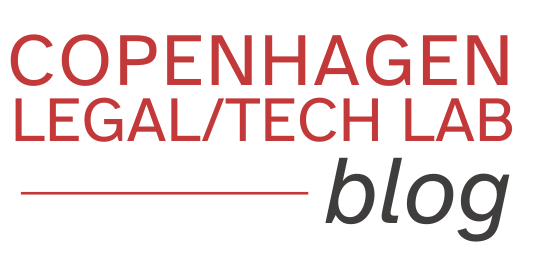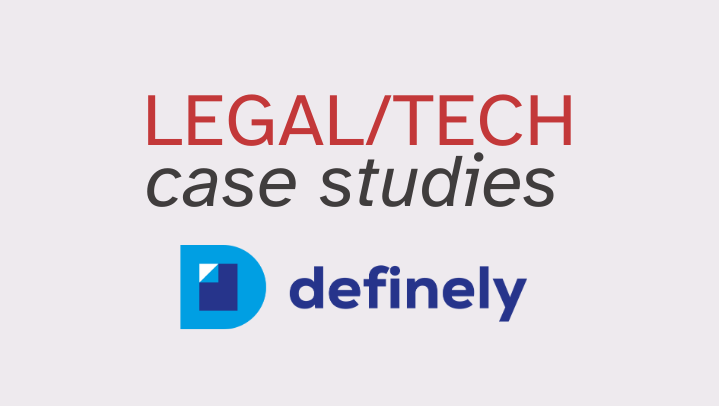Definely – from an idea to a product
#Accessibility
In 2016, two lawyers, Feargus and Nnamdi, at Freshfields were working on a case with thousands of complex documents. One of the lawyers, Feargus, had a visual impairment and was one of the few registered blind solicitors practising in the City of London. When working with these documents, they recognised how managing so many diverse and lengthy documents becomes remarkably constraining. Even more so, if one suffers from any form of physical impairment. Legal drafting is described as the “the preparation of any written legal document – a motion, a letter, a brief, a memo, or a contract”.
People who do not have accessibility needs or limitations tend to use a diverse set of tools, many of them far from efficient. They do struggle when using ineffective and cumbersome tools. This is due to the fact that for decades, teams that design technological solutions have been fairly homogeneous and in their design have only addressed their own needs, disregarding those of others.
Thus, Feargus and Nnamdi, decided to change this uncritical approach. Feargus and Nnamdi founded Definely to design solutions for lawyers that are inclusive and easy to use by everyone, thus introducing universal design to the next generation of legal tech.

#Universal design
Feargus and Nnamdi decided to develop a tool specifically focusing on drafting and reviewing complex legal contracts. When lawyers are working on complex contracts, they need to continuously move backwards and forwards in the document and adjust different sections as a consequence of changing a sentence here and there. In practical terms, they would often switch between multiple windows and monitors, while working on one document, reviewing another and keeping an overview of all their changes.
However, for a partially sighted person, dealing with this – seemingly – straightforward process represents a considerable restriction for their work. Thus, the idea was there. How to make legal drafting easier for people with accessibility needs? The founders’ goal was to mitigate the challenges that many lawyers were having when carrying out – seemingly – ordinary tasks while preparing a contract.
At first, when they started developing the tool, they were not thinking about creating a commercially-viable platform. Neither were they thinking about turning it into a legal tech product, targeted at a much larger group of people. Rather than creating a product for the market, the underlying intention behind their idea was working on an accessibility challenge that people in the legal industry were neither realising nor focusing on overcoming.
From Universal Design to Universal Solution: #SpeakToYourColleagues
The process of building the tool began in 2018. The two founders did not have any specific skills in computer science. Hence, they reached out to an external team of software developers that designed the first version of the tool.
As soon as the initial prototype was ready, lawyers working at Freshfields were asked to try the tool and share their feedback. This was a key phase during the development process. Comments from people that were using Definely were extremely positive. Majority of the testing lawyers found the tool profoundly helpful and observed considerable benefits to their work.
During this stage, talking with colleagues and collecting their observations on their use, experience and perspectives on the value of the prototype served as an early, and notably fundamental, market validation.This process allowed the founders to understand how useful and relevant their product would be and also to determine its potential profitability.
The idea, initially targeted at a specific small group of lawyers, was being praised by a much larger group. It was at this point that the founders realised that their idea had a much larger potential.
Their prototype solved a pain-point that every lawyer was facing. The tool was simplifying the way people worked with the tremendous amount of information that contracts, by their complex nature, often conceal. Drafting contracts using Definely was intuitive and did not require switching between multiple windows, using CTRL+F or different files. They were provided with all the information they needed to understand the provision in front of them without ever needing to navigate away from that provision.

#ForLawyersByLawyers
One of the main reasons behind the initial great feedback that Definely received was that people who were using Definely appreciated the fact that it was actually a tool designed for lawyers, by lawyers. Usually, when people have a ringside seat to a problem, it can be easier for them to work on the right approach to eventually solve it. And that is what happened with Definely. Being close to the pain-point helped the founders to develop a solution that worked successfully. Not only in theory, but actually in real life too.
Sometimes lawyers work with technology that is not specifically designed for the legal industry. Thus, the tools they’re using do not really solve their particular limitations.
Definely, born, developed and revised, actively gathering feedback from people working in the legal industry, met a high level of satisfaction from its end-users.
Asking in-house counsels, working in various fields – i.e. banking, insurance, health – to test the solution, helped the team to better shape their original idea. Listening to users’ comments gave them the chance to redesign some of the already existing elements and eventually add new useful features. Successful start-ups design their first product, and let their customers design all the rest.
So, how does Definely actually work? Essentially, it is a Microsoft Word plug-in. It sits on top of contracts and scans the document. It uses a rule-based algorithm and Artificial Intelligence Natural Language Processing technology, trained with thousands of documents, to pick up all the references and definitions inside the contract. The tool displays all the references and definitions on a side panel, allowing the users to easily work with them. And everything is done locally on the user’s computer, without uploading any kind of information on a cloud server. This guarantees that all the sensitive data is kept safely and not shared with anyone.

From idea to a product: #Fuse
The first pitch session took place in 2019. Regrettably, it did not go as the founders had originally expected. The UX was not completely optimised and some features were not fully user-friendly. The platform was not a commercially-viable product. Yet. The team had two choices: abandoning the idea or trying to see if, by improving the solution, things might have gone differently.
It is common for start-ups to encounter obstacles at their early development stages. Undoubtedly, fear is viewed as the biggest obstruction to progress and growth. And, sadly, fear is often excessively common in the legal industry.
However, Feargus and Nnamdi firmly believed in their idea. They continued to focus on how to enhance the product they had built. Subsequently, they managed to convince people to invest in their company and this helped them to expand the team and accelerate their development. When investors see that the founders are able to listen to them and improve their product, they are more willing to invest. Perseverance is simply a necessity in the start-up world.
By the end of 2019 the team joined FUSE, a collaborative tech and innovation space based at Allen & Overy law firm in London.
By joining FUSE, Definely was able to work with more lawyers using their product. More tests were carried out, more features were improved. At this stage the tool was finally starting to become a commercially-viable product.
Allen & Overy became Definely’s first paying customer. Having a paying customer shows that the product is not only viable but that it generates tangible return on investment and utility for that customer. This confidence boost gave Definely the chance to start approaching other law firms in the UK and outside.
Already a couple months into 2020, Definely was growing. Originally a team of 2 expanded to 33 members. And this despite the Covid-19 pandemic.
As of today, more than 5000 lawyers are actively using Definely. Lawyers using it are satisfied and they frequently give feedback regarding which features could be added to improve its usability. Definely is described as a tool that people in the industry want to use. In fact, its adoption rate is higher compared to similar legal tech products.

In 2022, Definely obtained an important investment from M12, Microsoft’s venture capital fund. For a platform specifically designed for MS Word, to receive money from Microsoft was definitely a great milestone.
When it comes to reflecting on their future, their main goal is to continue focusing on simplifying the way lawyers work. In order to do so, a good connection with customers is the key. By listening to what the users are asking for, they will be able to promptly add new useful features and launch other updates and new products, thus maintaining their agility.

This case study underlines the power of accessibility and inclusion. Technology has truly a great potential and when thinking and designing it for everyone, we can unlock many new features.
The idea of solving an accessibility issue faced by a visually impaired lawyer ended up becoming a legal tech, currently used by thousands of people in the legal field.
Building a change takes a lot of time and lots of ups and downs. But now more than ever, progress is crucial for the legal sector, which struggles to keep the pace.
Lawyers face many efficiency-related issues everyday. Most of these problems are often related to the obsolete tools that people in the industry are using. Therefore, investing in the potential of technology is essential. Technology should be viewed as an enabler, rather than a threat. There is a need for new ideas and innovative solutions to the legal industry’s generally-recognized problems.
Law is often described as an old-fashioned field that is slow to change. However, the change is already on its way. And Definely is a clear example of this essential change.
#3LessonsFromDefinely
As we go through Definely’s first steps in the market and subsequent growth as a legal tech key player, 3 central messages can be highlighted:
- #UniversalDesign: Including rather than excluding. A diverse team is essential to build an all-embracing design. Only by involving a heterogeneous team can you create a solution that ultimately helps everyone.
- #Collaboration: Asking for feedback is key. It helps sharpen your ideas. Cooperation makes the process of solving blind spots smoother. And this boosts the possibilities that your product will work more efficiently and precisely.
- #InnovativeEnvironment: Always be a sponge to innovation. Being part of innovative environments helps focusing on the upcoming potentialities of the field. Listening to colleagues and people from different backgrounds helps seeing things from multiple perspectives.
This case study has been prepared by:
- Associate Professor Alexandra Andhov
- Student Assistant Filippo Castorio

